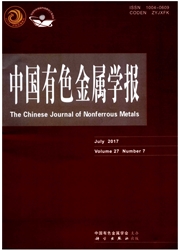

 中文摘要:
中文摘要:
采用粉末冶金法制备多孔TiNi合金,并利用无压熔渗镁合金(AZ91D)工艺按设计要求制备具有近零膨胀特性且轻质高强的AZ91D/TiNi复合材料。结果表明:AZ91D质量分数为8.20%-13.95%时,复合材料在一定的温度范围呈现近零膨胀行为,且热膨胀系数实验值与混合定则理论预测值相近;多孔TiNi合金的负热膨胀特性由相变引起的体积变化导致,而其复合材料呈现近零膨胀是由多孔TiNi基体产生的负热膨胀被渗入的镁合金相正热膨胀抵消所致;引入镁合金对复合材料基体合金的相组成和相变行为影响很小,但可显著提高其强度,复合材料仍具有稳定的线性超弹性。
 英文摘要:
英文摘要:
TiNi alloy based composites tailored by Mg alloy (AZ91D) were fabricated by powder metallurgy process combining with pressureless infiltration technique, which possess low density, high strength and the near-zero thermal expansion performance. The results show that, the AZ91D/TiNi composites exhibit near-zero thermal expansion performance at a certain temperature range when the AZ91D alloy mass fraction is between 8.20% and 13.95%. The experimentally measured coefficients of thermal expansion (CTEs) of the composites are close to those theoretically ones predicted by the rule-of-mixture (ROM). It is proposed that the negative thermal expansion (NTE) phenomenon of the porous TiNi alloy originates from the volume change accompanying the phase transformations of the TiNi alloy matrix. The near-zero thermal expansion performance of AZ91D/TiNi composites is attributed to the combination of the NTE produced by the porous TiNi alloy matrix and the positive thermal expansion provided by the infiltrated AZ91D alloy phase. The introduction of AZ91D alloy has little influence on the phase constituents and transformation characteristics of the bulk matrix, while significantly increasing the strength of the composite. At the meantime, the steady linear superelasticity of the composites is maintained.
 同期刊论文项目
同期刊论文项目
 同项目期刊论文
同项目期刊论文
 Phase field simulation of coherent precipitation of Ni4Ti3 particles during stress-assisted aging of
Phase field simulation of coherent precipitation of Ni4Ti3 particles during stress-assisted aging of Fine-Grained Bulk NiTi Shape Memory Alloy Fabricated by Rapid Solidification Process and Its Mechani
Fine-Grained Bulk NiTi Shape Memory Alloy Fabricated by Rapid Solidification Process and Its Mechani Three-dimensional phase field simulation of the morphology and growth kinetics of Ni4Ti3 precipitate
Three-dimensional phase field simulation of the morphology and growth kinetics of Ni4Ti3 precipitate Phase transformation and damping behavior of lightweight porous TiNiCu alloys fabricated by powder m
Phase transformation and damping behavior of lightweight porous TiNiCu alloys fabricated by powder m Phase field modeling of Ni-concentration distribution behavior around Ni4Ti3 precipitates in NiTi al
Phase field modeling of Ni-concentration distribution behavior around Ni4Ti3 precipitates in NiTi al Phase field simulation of Ni4Ti3 precipitation in porous NiTi shape memory alloys under applied stre
Phase field simulation of Ni4Ti3 precipitation in porous NiTi shape memory alloys under applied stre 期刊信息
期刊信息
